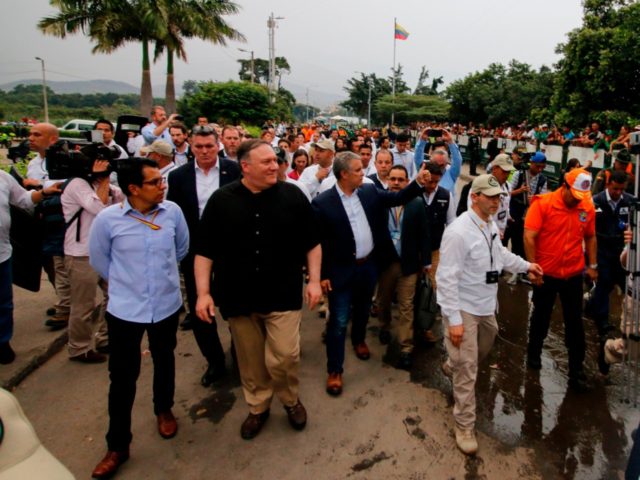Secretary of State Mike Pompeo concluded a short tour of Latin America Sunday with a visit to Cúcuta, Colombia, a border city Venezuelan dictator Nicolás Maduro blocked off this year to prevent U.S. aid from entering his impoverished country.
Pompeo arrived in Cúcuta to meet Colombian President Iván Duque after attending Palm Sunday services in Peru, where he also addressed the socialist crisis in Venezuela. Peru has taken in 740,000 of the over 3 million Venezuelan refugees that have flooded the region, fleeing Maduro’s socialist dictatorship and seeking food and medicine. Only Colombia has taken in more. Venezuela’s is the largest refugee crisis in the history of the Western Hemisphere and experts believe that, by the end of this year, it will reach comparable numbers to the exodus of 5.6 million from Syria that began in 2011.
In Peru, Pompeo reiterated the Trump administration policy regarding mass migration. “Our goal is to allow people to stay in their countries of origin, that is the wish of President [Donald] Trump,” he told reporters. “We want to create the conditions in those countries so that they can stay in their own country and do not have the need to emigrate elsewhere.”
He also rejected the idea of dialogue with the Maduro regime because “we have always said: with dictators, with tyrants, there is no dialogue.”
In Cúcuta, Venezuelans greeted Pompeo at the Colombian border with chants of “freedom!” and “intervention!” expressing support for a U.S. role in the restoration of peace to what was once the region’s wealthiest country. He then visited a refugee housing center in the city near the Simón Bólivar bridge, the only one still open to allow traffic to flow between the two nations.
In his remarks after meeting with Venezuelans in the country, Pompeo emphasized the religious significance of spending Palm Sunday with some of Venezuela’s most destitute and issued an urgent demand for Maduro to allow aid to enter his country, both to help Venezuelans and to ease the pressure on Colombia to house and feed its neighbors.
“It’s a special day, too, because this is Palm Sunday. To see the need, to see the hurt in these people’s eyes on this important day, was truly something,” Pompeo remarked. He noted that many in Cúcuta are not permanent refugees: they live in Venezuela but near the border. One mother he described, “is torn; she is unwilling to abandon her family and friends, but also unable to provide for them in her home country. So Geraldine goes back and forth across the bridge, across the border.”
He noted that Washington has donated $213 million so far, with more on the way, in food and medicine for Venezuela, “but actually getting this aid into Venezuela is a whole ‘nother story, because Nicolás Maduro refused to accept it.” Channelling Ronald Reagan’s Berlin Wall speech, Pompeo urged:
Mr. Maduro, open these bridges, open these borders. You can end this today. I hope that you care. I hope that you will care enough when you see the horror, when you see the tragedy, to change your ways and to leave your country.
The secretary of state also demanded Maduro step down.
“All Venezuelans and the world should reject the illegitimate authoritarian rule imposed on the Venezuelan people, including the Venezuelan military leadership,” he stated, promising, “The United States will continue to utilize every economic and political means at our disposal to help the Venezuelan people. Using sanctions, visa revocations, and other means, we pledge to hold the regime and those propping it up accountable for their corruption and their repression of democracy.”
Cúcuta, which borders Venezuela’s Táchira state, has been a focal point of the country’s refugee crisis for years. As the nation’s economy began collapsing following the death of dictator Hugo Chávez in 2013, Táchira locals began needing to travel into Colombia regularly to buy basic goods. Maduro responded to the flight by blaming unspecified “smugglers” and closing the borders, opening them only on weekends. The small timeframe to enter Colombia resulted in tens of thousands of Venezuelans flooding the city during the short opportunities they received to enter it. After one particularly dramatic mass entry into Cúcuta, Maduro officials claimed that there were no shortages in Venezuela and those crossing the border had merely done so for “fun.”
The Maduro regime’s refusal to accept that it has caused a humanitarian crisis is also the reason it uses to prevent international aid from entering the country. Former foreign minister and current Vice President Delcy Rodríguez claimed in 2017 that there was “no hunger in Venezuela” despite reports that Venezuelans were involuntarily losing 20 pounds on average a year. In February, she alleged that American food and medicine was “contaminated and poisoned,” and that Washington “is looking to poison our people with chemicals. We could call them biological weapons.”
The threat of famine and spread of preventable diseases in light of a shortage of nearly every basic medication in the country has triggered demands for a U.S. military intervention, as the Venezuelans in Cúcuta demonstrated. In several publish appearances during his Latin America tour, Pompeo refused to reject a military option as a last resort for the United States and international community to remove Maduro.
“I don’t know how much longer the Venezuelan people will tolerate this. My guess is not much,” Pompeo told Gisella Lopez of Peru’s El Comercio. “The tragedy of the humanitarian situation there brought out solely by Maduro making the choice to bring in the Cubans, to allow Russians to intervene in the country – those are the things that are destroying the lives of young people in Venezuela, and I’m very hopeful that Maduro will understand that his time is coming soon.”

COMMENTS
Please let us know if you're having issues with commenting.